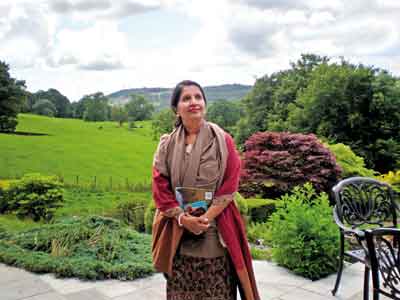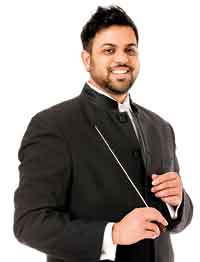Music Beyond Borders: Nirupama’s vision of a unifying platform becomes a reality
View(s):
Nirupama Rao: Promoting harmony through music
She has worked with the Symphony Orchestra of Sri Lanka (SOSL) to take this idea forward, and on February 7, coinciding with the 70th anniversary of Sri Lanka’s independence as India already celebrates this great milestone, musicians of both countries will come together on a unifying platform of common passions to showcase a concert of symphonic music.
“Music speaks a universal language that transcends borders. My dream is to see that its magic works in our own region of South Asia, bringing people together, building harmony and mutual understanding. The February concert in Colombo is a first step in that direction. I hope we will be able to take our project to create a South Asian Symphony Orchestra onward and forward, with support from music lovers everywhere. Let the young people of South Asia use the power of music to build peace,” Ms. Rao said in a statement.
The February 7 concert will feature Vienna based, renowned pianist Marialena Fernandes of Mangaluru origin, who will perform Mozart’s Piano concerto, No. 27, under the baton of US-based conductor Viswa Subbaraman who will also conduct the joint orchestra in Beethoven’s Symphony No 07 and Rossini’s Overture to La Cenerentola.
Mozart’s final piano concerto is one of the most subtle and perfect works in the repertory. Composed a year before his death, the concerto combines the simple elegance one has come to expect of Mozart with a sense of poignancy; the music is at turn luminous and tragic, and though this may simply be a product of an evolving style, one cannot but imagine it hints at a farewell.
Written at the same time as his “Immortal Beloved” letters, Beethoven’s Seventh is considered to have the same positive emotion. The celebratory, exuberant seventh symphony reflects a fleeting but happy stage in Beethoven’s otherwise turbulent life. Beethoven himself called it “one of the happiest products of my poor talents.”
The concert will start with the overture to La Cenerentola by Rossini. This is Rossini’s take on the Cinderella story, and like many of his works, was written at breakneck speed. Though little heard in Sri Lanka, this is one of Rossini’s best-known operas. based on the fairy tale story of Cinderella.
‘Music Beyond Borders will take place at the Ladies’ College Hall at on February 7 at 7.30 p.m. Tickets and box plan are now available at the Lionel Wendt Theatre.
Music Beyond Borders is sponsored by the Indian Council for Cultural Relations, with co-sponsors Morison’s, Brandix Inspired Solutions, East India Holdings, Electronic Media Sponsors Yes FM, TV1 & Legends 96.6 with Hospitality Partner Fairway Colombo.
| Combining her twin passions of music and sports | |
| Pianist Marialena Fernandes shared some thoughts on the forthcoming concert:
I have performed many of Mozart’s Piano Concertos, this particular one appeals to me especially, having been composed as the last one in the year of his death, and its form and methodical structure leading to the inspiration Mozart had on Beethoven.
I started this project in 2015, with the intention of sharing my passion and my life as a musician not only with students in Europe, where I have been living for the past 40 years, but also to initiate an intense interaction between European and Indian Talent. This includes global thinking, education on a broader level, breaking barriers, building bridges through the joy of risk-taking, experimentation and freedom of artistic thought. “Sport and Music” was a development which resulted from a simple game of football played during this project in 2015 by my colleagues from Vienna with kids from Mangalore. Ever since, we try and follow this up every year This will be the 4th year in succession, most of it taking place in Goa, Bangalore and Mangalore.
The theme of this project is sharing and exchanging. I bring musicians from Europe to play with talented youth in India and hold workshops with socially neglected groups. There is description, explanation of musicial ideas also with educators and students from both parts of the world.
I was very fortunate to be a Prize Winner at the Bicenntenial Beethoven Competition organised by the Goethe Institute in India, which offered me a scholarship to go first to Munich, then to Vienna, ever since the City of my Dreams.
|
| Conducting combines both the emotional and intellectual sides of music | |
Extracts of an email interview with conductor Viswa Subbaraman
Preparation and passion: I had a mentor tell me once that we have the greatest job in the world, and our penance is the detailed preparation. It’s incumbent on us to think about every note in the context of what we believe the composer to be saying. I always want to know when in the composer’s life the piece was written and what the composer was dealing with. If the composer lost his wife, it is hard for me to imagine that that didn’t affect the emotional content of the work. We use that to build what we think the composer had in mind for an emotional arc for the work. If we are truly prepared on the podium, the hope is we can translate that to inspiring the musicians to believe as we do. That being said, I think that’s the magical conductor moment. Can s/he make that happen? Some do with ease and some never can. I had a teacher once say, “I can teach anyone to conduct, but I can’t teach a conductor”. It’s that development of trust and inspiration with the musicians that is difficult to quantify.
I think first and foremost, I have to say my time with Maestro Kurt Masur. To work with one of the greatest conductors of a generation who had worked with so many world class artistes and orchestras was the foundation of how I work. I have also been honoured to premiere almost 10 operas, and each one was like bringing a new child into the world.
I believe this to be true. Musicians for the most part aren’t concerned where their colleagues come from or their beliefs if they bring a passion and talent for making music. When you couple that with the fact that every musician in the end must show humility before the music, it is an incredibly equalizing experience.
I am thoroughly honored to conduct this work. I truly believe that the act of making music brings people together in a way that develops empathy and understanding. The world could use more of that. I hope this is the beginning of a truly joint South Asian experience. South Asia is still one of the few regions without a truly world class orchestra, and I hope we are on the verge of changing that.
|



 What made you choose the K595 as the concerto to perform at this concert?
What made you choose the K595 as the concerto to perform at this concert? I was actually a premedical student in college (and I finished a degree in biology to go with my music degree). I had always had a love of music, but I never imagined it could truly be a career. I spent one semester of college in Vienna with the wind symphony from Duke, and I was completely immersed in music for the year. I fell in love with the ability to have a voice in a way that I had truly never imagined. I saw my first professional orchestra concert live. It was one of those turning points where I realized the type of work that would bring me joy. For me, conducting is the perfect balance of the emotional and the intellectual sides of music. You have to break down the architecture of the piece and then turn around and inspire musicians to play the emotional arc of the work. It’s a fascinating balance.
I was actually a premedical student in college (and I finished a degree in biology to go with my music degree). I had always had a love of music, but I never imagined it could truly be a career. I spent one semester of college in Vienna with the wind symphony from Duke, and I was completely immersed in music for the year. I fell in love with the ability to have a voice in a way that I had truly never imagined. I saw my first professional orchestra concert live. It was one of those turning points where I realized the type of work that would bring me joy. For me, conducting is the perfect balance of the emotional and the intellectual sides of music. You have to break down the architecture of the piece and then turn around and inspire musicians to play the emotional arc of the work. It’s a fascinating balance.